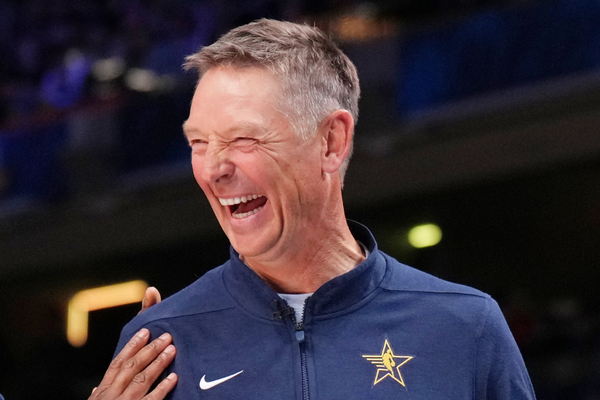
via Imago
Feb 16, 2024; Indianapolis, Indiana, USA; Team Detlef honorary coach Detlef Schrempf reacts during a Rising Stars semifinal game at Gainbridge Fieldhouse. Mandatory Credit: Kyle Terada-Imagn Images

via Imago
Feb 16, 2024; Indianapolis, Indiana, USA; Team Detlef honorary coach Detlef Schrempf reacts during a Rising Stars semifinal game at Gainbridge Fieldhouse. Mandatory Credit: Kyle Terada-Imagn Images
When you think of NBA stars who’ve left a lasting impact on and off the court, Detlef Schrempf will definitely be one of them. Born in Leverkusen, Germany, this 6-foot-10 powerhouse brought his unique talents to the NBA, dominating the league for an incredible 16 years. Along the way, Schrempf earned three All-Star selections, two Sixth Man of the Year titles, and even made the All-NBA Third Team in 1995.
But it’s not just his basketball skills that deserve the spotlight. Schrempf made the most of his NBA earnings, endorsement deals, and smart business ventures, building a net worth of $5 million. Beyond his wealth, he’s embraced life as a businessman and a devoted father of two. So, let’s explore how he turned on-court success into lifelong prosperity.
ADVERTISEMENT
Article continues below this ad
Schrempf’s NBA journey
Detlef Schrempf’s story began in Centralia, Washington, where he led his high school basketball team to a Class 3A state championship in 1981 after migrating from Germany. His talent only grew from there. In college, he became a standout for the Washington Huskies, steering them to back-to-back Pac-10 titles in 1984 and 1985. For his incredible contributions, he earned All-Pac-10 honors and even landed on The Sporting News’ All-America Second Team.
When the Dallas Mavericks picked Schrempf eighth overall in the 1985 NBA Draft, it was just the beginning of his professional journey. While his start in Dallas showed promise, his career truly took off after a trade to the Indiana Pacers in 1989. Known for his versatility and scoring off the bench, Schrempf won back-to-back Sixth Man of the Year awards in 1991 and 1992, firmly establishing himself as one of the league’s most dependable players.
By 1993, Detlef Schrempf had transitioned from a star substitute to a starter, earning his first All-Star appearance during his final season with the Pacers. That offseason, a trade to the Seattle SuperSonics opened a new chapter. Over the next six seasons, he became an integral part of the Sonics’ success, hitting career highs with 19.2 points per game in 1994.

via Imago
US PRESSWIRE Sports-Historical Unknown date 1996 Phoenix, AZ, USA FILE PHOTO Phoenix Suns forward Charles Barkley 34 defended by Seattle Supersonics forward Detlef Schrempf 11 at America West Arena. Phoenix Arizona UNITED STATES, EDITORIAL USE ONLY PUBLICATIONxINxGERxSUIxAUTxONLY Copyright: xUSAxTODAYxSportsx 5430952
After dominating the court for over a decade and earning a spot in the hearts of basketball fans, Schrempf hung up his jersey in 2001 after stints with the Portland Trail Blazers and beyond. Little did anyone know his next chapter would surprise everyone.
But here’s the thing—basketball wasn’t just his calling; it was a platform that set him up for massive earnings. Schrempf pulled in an impressive $29.3 million in salary throughout his career. Adjust that for inflation, and you’re looking at nearly $60 million in today’s dollars! While most players might burn through that kind of cash, Schrempf used it as a springboard, solidifying himself as one of the most strategic earners the NBA has ever seen.
What’s your perspective on:
Is Detlef Schrempf the ultimate example of turning sports fame into lifelong success and impact?
Have an interesting take?
Retirement and his business ventures
Still, basketball glory and millions weren’t enough for Schrempf. Five years after retiring, he briefly stepped into the NBA again in 2006, this time as an assistant coach for the SuperSonics. That move, however, was short-lived. By 2007, Schrempf shifted gears entirely, taking on a business role at Coldstream Wealth Management. As the director of business development, he found a whole new way to channel his skills. But his entry into the business world didn’t start there—it was years in the making.
In fact, Schrempf co-founded Athlon Ventures, a private equity fund, back in 1995 while still playing in the NBA. Reflecting on this move, he shared with 425 Magazine how he relied on friends active in the tech-driven business scene for guidance. “I was fortunate to have good friends who were pretty active in the local business community,” Schrempf said, pointing out that networking played a huge role in his post-NBA ventures.
“At the end of my career, we were always discussing the next steps in life,” he explained. “I decided to partner up with one of them… to start a venture fund.” For Schrempf, it wasn’t just about the money—it was about leveraging his name and network to carve out a new identity.
ADVERTISEMENT
Article continues below this ad
Detlef Schrempf’s philanthropy and pop culture presence
It’s one thing to dominate on the court, but Detlef Schrempf has made just as big an impact off of it. He founded the Detlef Schrempf Foundation, which supports kids’ charities in the Pacific Northwest. On top of that, he helped kick-start initiatives like the Seafood Nutrition Partnership and the Erase the Hate campaign.

USA Today via Reuters
Feb 16, 2024; Indianapolis, Indiana, USA; Team Detlef honorary coach Detlef Schrempf reacts during a Rising Stars semifinal game at Gainbridge Fieldhouse. Mandatory Credit: Kyle Terada-USA TODAY Sports
But that’s just scratching the surface. In 2012, he was honored with the prestigious Paul Allen Award for Citizenship, recognizing his commitment to the community. The crown jewel of his foundation’s efforts? The annual Detlef Schrempf Celebrity Golf Classic, a summer tradition that’s raised a staggering $10 million for children’s charities.
ADVERTISEMENT
Article continues below this ad
Interestingly, Schrempf’s influence extends far beyond basketball or philanthropy. He’s dipped his toes into pop culture in some pretty memorable ways. From appearing in Married… with Children and Parks and Recreation to name-drops in shows like Unbreakable Kimmy Schmidt and Frasier, Schrempf has proven he’s more than just a former NBA star. He even had a cameo in a German soap opera.
And let’s not forget his shoutouts in music and sports entertainment. There’s a song named after him by Band of Horses, and WWE RAW gave him a nod through commentator Renee Young. Fans also went wild when he made an appearance during the Seattle Kraken’s mascot reveal, playfully hinting at the return of Squatch, the former Sonics mascot. From hoops to Hollywood and beyond, Schrempf is still scoring in every sense of the word.
ADVERTISEMENT
ADVERTISEMENT
ADVERTISEMENT
ADVERTISEMENT


Is Detlef Schrempf the ultimate example of turning sports fame into lifelong success and impact?